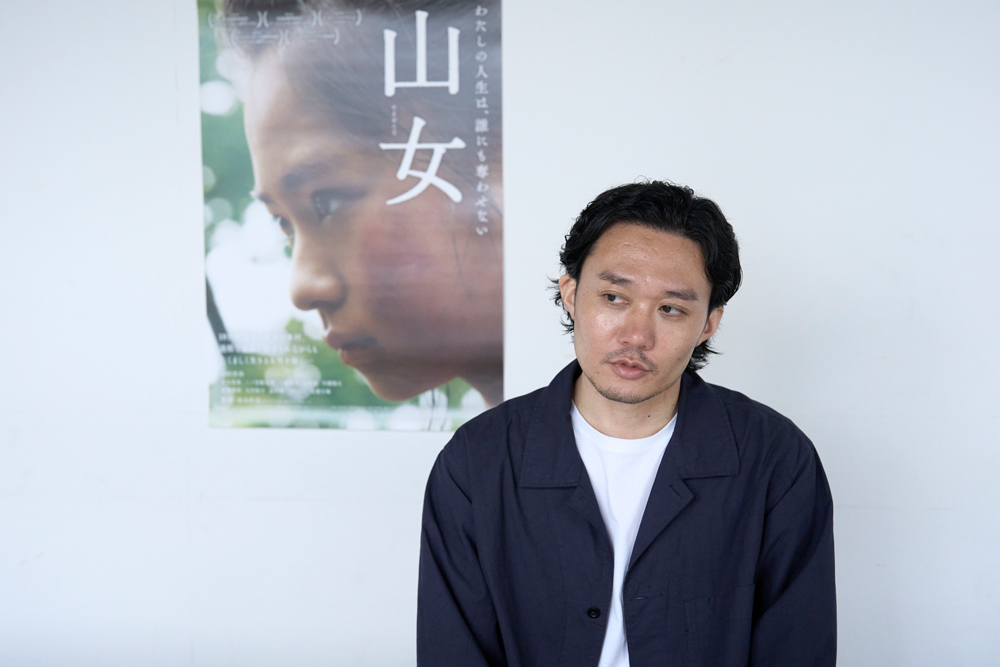!["Yamajo" Director Takeshi Fukunaga Humans are complex and multifaceted [Director's Interview Vol.328]](https://cinemore.jp/images/6d4131d07040f02a5ff1b60c4b757d0b0ef8c9295ca02745be6aa772d8401033.jpg)
"Yamajo" Director Takeshi Fukunaga Humans are complex and multifaceted [Director's Interview Vol.328]
What overseas experience brings
Q: The forest scenery captured by cinematographer Daniel Satinoff is overwhelming. What effect did the inclusion of a foreign photographer's perspective have on the film?
Fukunaga: I started making films in America, so it's easier and smoother to have a foreign cinematographer help me with the flow of the scene and the approach to filming. Also, this film wouldn't work if it wasn't shot in a way that made you feel the awe of nature. Daniel's compositions are very beautiful, and he himself has a strong feeling for nature, which was a big factor. There are other Japanese approaches, such as how to shoot traditional Japanese houses, but this time Daniel had no prior knowledge of that, so he was able to capture what was in front of him very objectively. I think that was also good.

“Yamaonna” ©YAMAONNA FILM COMMITTEE
Q: Recently, you have been directing streaming works with different themes, contents, and budgets than the movies you have shot so far, such as "TOKYO VICE S2" (broadcast date undecided) and "SHŌGUN" (scheduled to air on the 23rd). How do you feel about actually being involved in these works?
Fukunaga: It was a good experience and I learned a lot. However, in American TV series work, the director does not have the final cut, so after the director's cut is released, I can't complain no matter how it is changed. What airs on TV is not something I edited, so in that sense I had to accept it. Still, the budget was incomparable to the works I've shot up until now, and I was able to grow in some ways through the experience of working with various equipment, staff, and many actors.
That's how I gained experience in terms of technique, but it's not something I really need as a writer. For me, filmmaking is still my main focus, so I'm still trying to see how I can sublimate the experience I gained from making dramas into my own work.
Reserve "Yamajo" now ↓

Director and scriptwriter: Takeshi Fukunaga
His first feature film, "White Blood of Liberia," was officially selected for the Panorama section of the Berlin International Film Festival in 2015, won the top prize at the Los Angeles Film Festival, and was nominated for the John Cassavetes Award at the Independent Spirit Awards in 2016. His second feature film, "Ainu Mosir," won the Special Jury Prize in the International Narrative Competition section of the Tribecca Film Festival in 2020, and the Best Film Award at the Guanajuato International Film Festival. This film, "Yama-Onna," is his third feature film. In recent years, he has directed episode 7 of the American drama series "SHŌGUN" and episodes 5 and 6 of "TOKYO VICE S2."
Interview and text: Fumio Koda
Editorial staff and writer for CINEMORE. My favorite movies are ``The Goonies'' and ``Indiana Jones and the Temple of Doom.'' My recent favorites are 4K digitally remastered classics by Akira Kurosawa and Yasujiro Ozu.
Photography: Kazunari Aoki
"kind of trout"
June 30th (Friday) Eurospace, Cinema Switch Ginza,
July 1st (Saturday) Shinjuku K's cinema and other locations nationwide
Distribution: Animo Produce
©YAMAONNA FILM COMMITTEE

